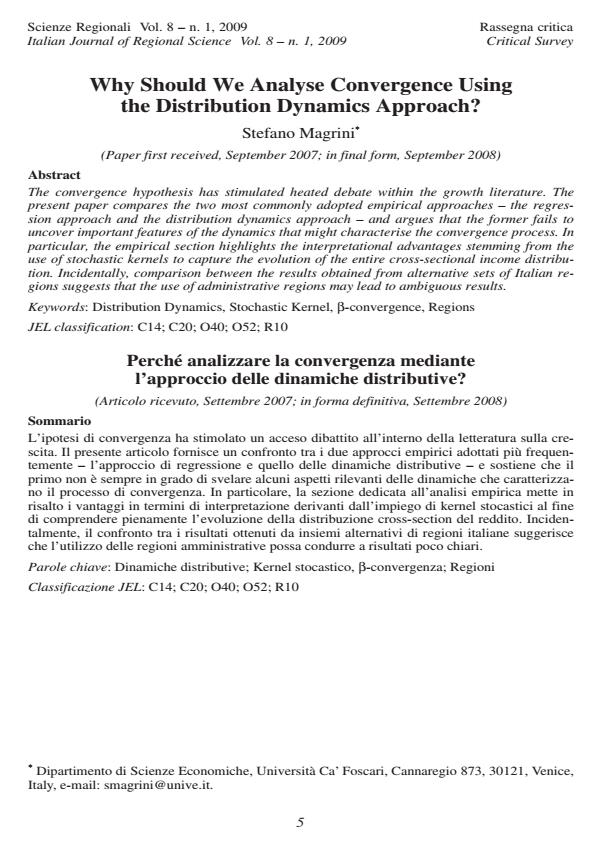Why Should We Analyse Convergence Using the Distribution Dynamics Approach?
Titolo Rivista SCIENZE REGIONALI
Autori/Curatori Stefano Magrini
Anno di pubblicazione 2009 Fascicolo 2009/1 Lingua Inglese
Numero pagine 30 P. 5-34 Dimensione file 453 KB
DOI 10.3280/SCRE2009-001001
Il DOI è il codice a barre della proprietà intellettuale: per saperne di più
clicca qui
Qui sotto puoi vedere in anteprima la prima pagina di questo articolo.
Se questo articolo ti interessa, lo puoi acquistare (e scaricare in formato pdf) seguendo le facili indicazioni per acquistare il download credit. Acquista Download Credits per scaricare questo Articolo in formato PDF

FrancoAngeli è membro della Publishers International Linking Association, Inc (PILA)associazione indipendente e non profit per facilitare (attraverso i servizi tecnologici implementati da CrossRef.org) l’accesso degli studiosi ai contenuti digitali nelle pubblicazioni professionali e scientifiche
Why Should We Analyse Convergence Using the Distribution Dynamics Approach? - Paper first received, September 2007; in final form, September 2008 The convergence hypothesis has stimulated heated debate within the growth literature. The present paper compares the two most commonly adopted empirical approaches the regression approach and the distribution dynamics approach and argues that the former fails to uncover important features of the dynamics that might characterise the convergence process. In particular, the empirical section highlights the interpretational advantages stemming from the use of stochastic kernels to capture the evolution of the entire cross-sectional income distribution. Incidentally, comparison between the results obtained from alternative sets of Italian regions suggests that the use of administrative regions may lead to ambiguous results. Keywords: Distribution Dynamics, Stochastic Kernel, -convergence, Regions JEL classification: C14; C20; O40; O52; R10
- Divergence of healthcare expenditure in sub-Saharan Africa Jamiil Jeetoo, Vishal Chandr Jaunky, in Studies in Economics and Econometrics /2023 pp.75
DOI: 10.1080/03796205.2023.2185664 - Regional income disparities, distributional convergence, and spatial effects: evidence from Indonesian regions 2010–2017 Felipe Santos-Marquez, Anang Budi Gunawan, Carlos Mendez, in GeoJournal /2022 pp.2373
DOI: 10.1007/s10708-021-10377-7 - Economic growth and club convergence: Is there a neighbour's effect? Arfat Ahmad Sofi, Subash Sasidharan, Mohammad Younus Bhat, in International Journal of Finance & Economics /2023 pp.2475
DOI: 10.1002/ijfe.2545 - The drivers of local income inequality: a spatial Bayesian model-averaging approach Miriam Hortas-Rico, Vicente Rios, in Regional Studies /2019 pp.1207
DOI: 10.1080/00343404.2019.1566698 - Disparities in regional productivity, capital accumulation, and efficiency across Indonesia: A club convergence approach Carlos Mendez, Mitsuhiko Kataoka, in Review of Development Economics /2021 pp.790
DOI: 10.1111/rode.12726 - Regional Convergence of Income and Education: Investigation of Distribution Dynamics Jørn Rattsø, Hildegunn Stokke, in Urban Studies /2014 pp.1672
DOI: 10.1177/0042098013498625 - Metody pomiaru realnej konwergencji gospodarczej w ujęciu regionalnym i lokalnym. Konwergencja równoległa Piotr Wójcik, (ISBN:9788323537298)
- Regional convergence, spatial scale, and spatial dependence: Evidence from homicides and personal injuries in Colombia 2010–2018 Felipe Santos‐Marquez, Carlos Mendez, in Regional Science Policy & Practice /2021 pp.1162
DOI: 10.1111/rsp3.12356 - Interregional inequality in Africa, convergence, and multiple equilibria: Evidence from nighttime light data Kacou Yves Thierry Kacou, in Review of Development Economics /2022 pp.918
DOI: 10.1111/rode.12851 - Income distribution dynamics across European regions: Re-examining the role of space Adolfo Maza, María Hierro, José Villaverde, in Economic Modelling /2012 pp.2632
DOI: 10.1016/j.econmod.2012.08.029 - The relationship between wellbeing dimensions and GDP: a regional empirical study Dorina Lazar, in Virgil Madgearu Review of Economic Studies and Research /2021 pp.45
DOI: 10.24193/RVM.2021.14.79 - The parallel convergence of income and educational achievements: joint distribution dynamics Piotr Tadeusz Wójcik, in The Annals of Regional Science /2022 pp.527
DOI: 10.1007/s00168-021-01086-7 - Regional income disparities and convergence clubs in Indonesia: new district-level evidence Harry Aginta, Anang Budi Gunawan, Carlos Mendez, in Journal of the Asia Pacific Economy /2023 pp.101
DOI: 10.1080/13547860.2020.1868107 - Lack of Global Convergence and the Formation of Multiple Welfare Clubs across Countries: An Unsupervised Machine Learning Approach Carlos Mendez, in Economies /2019 pp.74
DOI: 10.3390/economies7030074 - Distribution dynamics: a spatial perspective Margherita Gerolimetto, Stefano Magrini, in Spatial Economic Analysis /2023 pp.64
DOI: 10.1080/17421772.2022.2095005 - Economic and Social Convergence in Colombia Vicente Royuela, Gustavo Adolfo García, in Regional Studies /2015 pp.219
DOI: 10.1080/00343404.2012.762086 - Well‐being in European regions: Does government quality matter? Jesús Peiró‐Palomino, Andrés J. Picazo‐Tadeo, Vicente Rios, in Papers in Regional Science /2020 pp.555
DOI: 10.1111/pirs.12494 - EU regional convergence and policy: Does the concept of region matter? Adolfo Maza, José Villaverde, in Journal of Policy Modeling /2011 pp.889
DOI: 10.1016/j.jpolmod.2011.03.007 - Population Divergence and Income Convergence: Regional Distribution Dynamics for Norway Jørn Rattsø, Hildegunn E. Stokke, in Regional Studies /2014 pp.1884
DOI: 10.1080/00343404.2013.799842
Stefano Magrini, Why Should We Analyse Convergence Using the Distribution Dynamics Approach? in "SCIENZE REGIONALI " 1/2009, pp 5-34, DOI: 10.3280/SCRE2009-001001